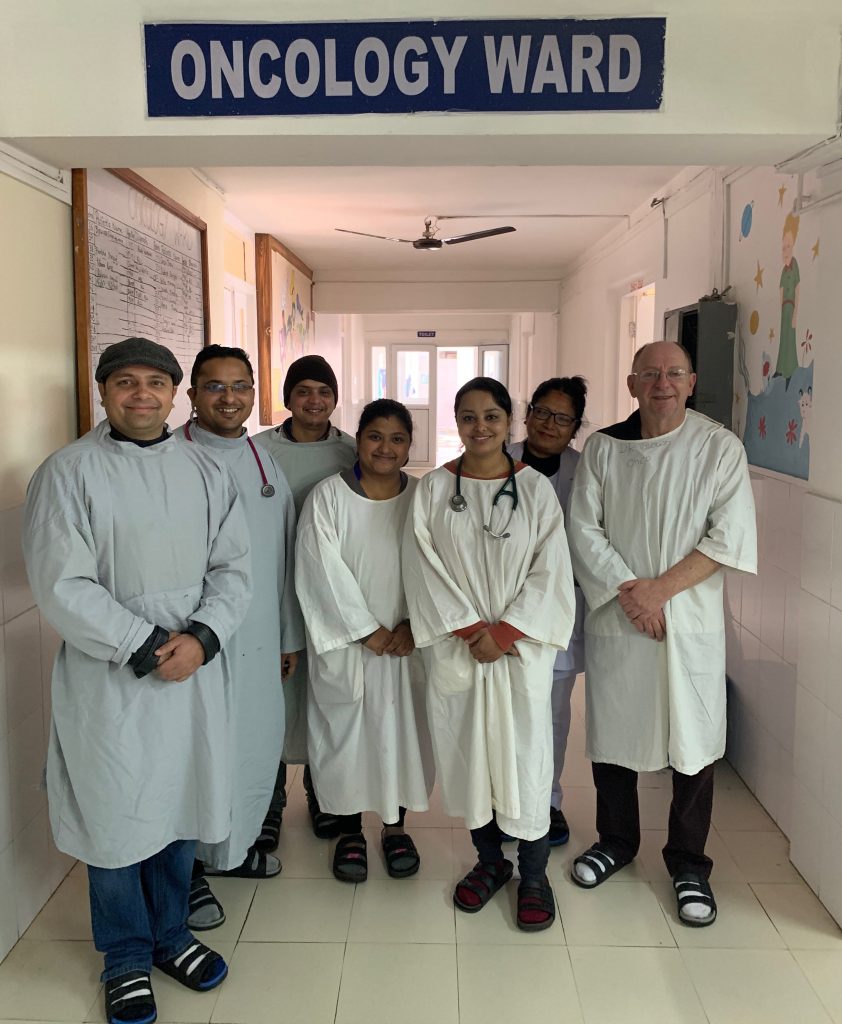The Problem
The improvement in outcome for children with cancer has been one of the most remarkable success stories in medicine in the UK and in the rest of the Western world. At present, in the UK more than 80% of children are cured of cancer. The picture in Nepal is, however, so very different. Despite recent improvements in children’s cancer care in Nepal it is estimated that of the children treated on the oncology unit at Kanti Children’s Hospital around 40% of children survive. However, the true picture is much more depressing that this. Most of the children with cancer in Nepal do not get diagnosed and for those that do many do not get to a specialist cancer hospital for treatment and even then, many children do not receive curative cancer therapy. Thus it is estimated that around 10% of children diagnosed with cancer are cured of their disease.
The oncology (cancer) unit at Kanti is the only government supported specialist paediatric oncology unit in the whole of Nepal, a country of around 30 million people. In contrast there are 19 specialist cancer children’s units in the UK.

What we have done
So The Child May Live first became involved with the oncology unit at Kanti in 1997 when we were invited to train a young paediatrician, Dr Kailash Sah, and a specialist nurse, Miss Ramah Ghimire, in paediatric oncology. Kailash and Ramah spent 4 months training with Prof Barry Pizer at Alder Hey Children’s Hospital. Kailash then was supported by So The Child May Live to receive one year of specialist training in a paediatric oncology unit in New Delhi, India, following which he was appointed to become the first Consultant Paediatric Oncologist in Nepal. Dr Sah was then joined by a second Consultant Paediatric Oncologist, Dr Tiwari.
Professor Pizer maintained very close contact with the oncology unit at Kanti, advising on the both the development of the unit as whole and on individual patient management. In the 2000’s there was clearly an improvement in the outcome of children with cancer; for example, with respect to the most common cancer, acute lymphoblastic leukaemia, it is estimated that the survival increased from around 20% to 40% between 2000 and 2015.
So The Child May Live continued to support the unit with respect to purchasing life-saving equipment and facilitating attendance of the consultants and other staff at international children’s cancer congresses. Prof Pizer visited Kanti in 2002 and then with yearly visits from 2008 onwards continued to support the development of children’s cancer services.
Our Activities
Specifically Professor Pizer continues to give advice on individual patient care but on a wider basis, he assisted the two consultants in selecting the most appropriate cancer protocols used on the unit. He also gave advice and support with regard to reducing the risk of infection an important cause of death in patients immunocompromised by cancer and its treatment. So The Child May Live helped introduce the use of infection control measures such as the routine use of hand gel. Professor Pizer has delivered lectures both at Kanti and to national cancer groups in Nepal.
World Child Cancer Project
In 2018 Professor Pizer and his wife, Jenni, had discussions with World Child Cancer with regard to a potential project supporting children’s cancer services in Nepal. World Child Cancer (WCC) is a well-established UK based charity which supports the development of children’s cancer services in numerous resource poor settings worldwide.
World Child Cancer were impressed by the potential of further development of children’s cancer services at Kanti and applied for a UK Aid matched grant from the UK Government’s Department for International Development (now the Foreign and Commonwealth Development Office). STCML organized a number of fundraising events towards this as the grant necessitated a concerted fundraising effort with pound for pound matching by DIFD. In total almost £300,000 was raised for the project which began in October 2020.

The WCC project is led clinically by Professor Pizer in conjunction with staff from WCC and the two paediatric oncologists, Dr Giri and Dr Sapkota. The aims of the project are to improve outcomes for children presenting with cancer across Nepal with the main work streams being:
- To develop a dedicated database for children with cancer treated at Kanti (with a full time data manager employed)
- To provide formal training for nurses in paediatric oncology
- To provide support for paediatric pathology to aid diagnosis
- To provide psycho-social and financial aid to support families in need
- To provide life-saving equipment on the oncology unit at Kanti
- To develop shared care service with other hospitals in Nepal so that families do not have to endure the hardship and expense of travelling to Kanti for each and every course of treatment
- To develop a cancer awareness programme across the whole of Nepal with the aim of improving the early recognition of childhood cancer thus improving survival
Significant progress has been made although of course the roll out of the project has been affected by the COVID pandemic. The project has received strong support from the Nepali government.
At the same time, the World Health Organisation have also been involved in children’s cancer at Kanti as part of their Global Initiative in Childhood Cancer which aims to have at least 60% of children surviving by the year 2030.
Although the work is largely funded by WCC, So The child May Live remain committed to Professor Pizer’s work in paediatric oncology and has provided additional support for the project, for example, financial support to help establish an NGO, ‘Together Against Childhood Cancer’ which in turn will support treatment of children’s cancer both during and importantly following the end of the WCC project. So The Child May Live is committed to the sustainability of the continued development of children’s cancer services in Nepal such that the majority of children with cancer can have a real chance of survival which historically has not been possible.
